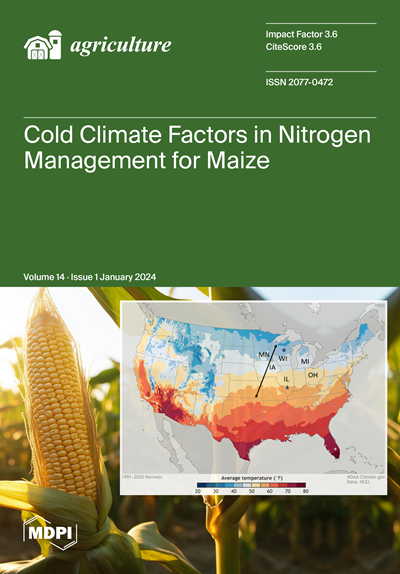利用微生物工艺提高废物沼气产量的进展与创新
IF 3.6
2区 农林科学
Q1 AGRONOMY
引用次数: 2
摘要
从废物中生产沼气已经成为可持续能源生产的一个有前途的途径,提供废物管理和可再生能源生产的双重好处。废物原料的选择和制备,包括农业残留物、食物垃圾、动物粪便和城市固体废物,对这一过程很重要,而微生物群落主要负责生物转化。本文就复杂微生物群落在废物厌氧消化中的作用及其功能进行了综述。它涵盖了关键的生理过程,包括水解、产酸、产丙酮和产甲烷,阐明了微生物活动和代谢途径,这些活动和代谢途径与提高沼气生产效率的前景有关。本文进一步讨论了分子技术的最新进展,包括基因组学、宏基因组学、元转录组学和稳定同位素探测。这些进步极大地提高了我们对微生物群落及其从废物中产生沼气的能力的理解。这些技术与过程监测和控制策略的整合已经被详细阐述,为优化沼气生产和确保过程稳定性提供了可能性。微生物添加剂、多种原料共消化以及通过微生物群落工程优化工艺是提高沼气生产效率的有效途径。本文还概述了基于微生物的沼气生产的新趋势和未来前景,包括利用合成生物学工具来设计新的微生物菌株和财团,利用极端环境中的微生物组,以及将沼气生产与其他生物技术工艺相结合。虽然有一些关于沼气生产技术方面的评论,但本文通过提供最新的见解和建议来利用微生物群落的潜力,以及它们在高效沼气生产中的生理作用,从而脱颖而出。这些见解强调了微生物在促进沼气生产方面的关键作用,最终有助于推动可持续和碳中和的未来。本文章由计算机程序翻译,如有差异,请以英文原文为准。
Advancements and Innovations in Harnessing Microbial Processes for Enhanced Biogas Production from Waste Materials
Biogas production from waste materials has emerged as a promising avenue for sustainable energy generation, offering a dual benefit of waste management and renewable energy production. The selection and preparation of waste feedstocks, including agricultural residues, food waste, animal manure, and municipal solid wastes, are important for this process, while the microbial communities are majorly responsible for bioconversions. This review explores the role of complex microbial communities and their functions responsible for the anaerobic digestion of wastes. It covers the crucial physiological processes including hydrolysis, acidogenesis, acetogenesis, and methanogenesis, elucidating the microbial activities and metabolic pathways involved in the prospects of improving the efficiency of biogas production. This article further discusses the influence of recent progress in molecular techniques, including genomics, metagenomics, meta-transcriptomics, and stable isotope probing. These advancements have greatly improved our understanding of microbial communities and their capabilities of biogas production from waste materials. The integration of these techniques with process monitoring and control strategies has been elaborated to offer possibilities for optimizing biogas production and ensuring process stability. Microbial additives, co-digestion of diverse feedstocks, and process optimization through microbial community engineering have been discussed as effective approaches to enhance the efficiency of biogas production. This review also outlines the emerging trends and future prospects in microbial-based biogas production, including the utilization of synthetic biology tools for engineering novel microbial strains and consortia, harnessing microbiomes from extreme environments, and integrating biogas production with other biotechnological processes. While there are several reviews regarding the technical aspects of biogas production, this article stands out by offering up-to-date insights and recommendations for leveraging the potential of microbial communities, and their physiological roles for efficient biogas production. These insights emphasize the pivotal role of microbes in enhancing biogas production, ultimately contributing to the advancement of a sustainable and carbon-neutral future.
求助全文
通过发布文献求助,成功后即可免费获取论文全文。
去求助
来源期刊

Agriculture-Basel
Agricultural and Biological Sciences-Food Science
CiteScore
4.90
自引率
13.90%
发文量
1793
审稿时长
11 weeks
期刊介绍:
Agriculture (ISSN 2077-0472) is an international and cross-disciplinary scholarly and scientific open access journal on the science of cultivating the soil, growing, harvesting crops, and raising livestock. We will aim to look at production, processing, marketing and use of foods, fibers, plants and animals. The journal Agriculturewill publish reviews, regular research papers, communications and short notes, and there is no restriction on the length of the papers. Our aim is to encourage scientists to publish their experimental and theoretical research in as much detail as possible. Full experimental and/or methodical details must be provided for research articles.
 求助内容:
求助内容: 应助结果提醒方式:
应助结果提醒方式:


